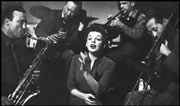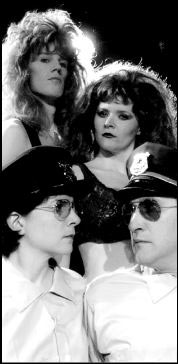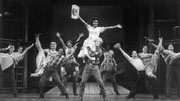Every once in a while, like after I eat too much chocolate and watch Terms of Endearment twice in a row, I find myself listening to Judy Garland in the car. It’s always an intense, masturbatory experience—comforting and cathartic and a little messy. But, yes, I listen to Judy, just like a good gay boy should. And then I take a shower.
I prefer her later recordings. I particularly like her great, ubiquitous Carnegie Hall album, where she sounds like Ethel Merman in a half-nelson. By that point, she was already the grand mistress of self-immolation, the epitome of personality triumphing over polish. Nobody in 20th-century pop culture flubbed more extravagantly than Judy Garland, and that’s why her persona remains the province of drag queens everywhere.
Of course, being gay and all, I’m expected to indulge my Judy thing in public, in the presence of My People. I should attend karaoke bars where I can sing “Get Happy” in my horsiest vibrato, and I’m expected to quote freely from A Star Is Born. And since Seattle is nearing that special, special time of year when My People are allowed to be seen by the light of day—I’m referring to Pride Week, of course—I do feel like catching some of the local Judy action. So I go to Thumpers.
Here I am, ready to hear the songs of Judy and her much-beloved daughter Liza in a cabaret show aptly entitled The Songs of Judy & Liza. Given the circumstances, sobriety seems inappropriate. I grab a gin and tonic. Then another. I’m a lightweight, so my pen starts to blur. Thumpers is a lovely shade of beige, I think to myself. It really ought to have a salad bar.
And so the show begins. I guess I didn’t read the press info very carefully, because I somehow expected to see drag queens onstage. I mean, the thought of Judy and Liza’s standards sung by actual women—well, it’s just plain wacky. Still, songstresses Ann Evans and Katie Tomlinson wear just enough sequins and glitter to pass for drag queens, and they pepper their onstage banter with fond insights into Judy’s vaudeville days (yes, it’s that kind of show). Tomlinson saves her best torch-song gaze for “Over the Rainbow.” A few of us hum along. She stares longingly at the track lighting.
The audience is chock-full of celebrities. The Seattle Court is here tonight, led by an enormous drag queen wearing a yellow power suit. Mr. Washington State Leather is here, too, flanked by a group of boys decked out in Leather Lite. (No one in the room seems to find this bizarre. All I know about leather I learned from Al Pacino in Cruising, so I just play dumb.) And Liza is here, too—or someone who looks very much like her, circa 1980—since the evening will conclude with a Judy/Liza look-alike contest. Or maybe “contest” isn’t quite right; she’s the only entrant.
After the show, I walk into the bar area to rendezvous with my boyfriend Jason. He’s showing his mother around “gay Seattle,” and she insists on going to Arena. We don’t deter her, so I end the evening alongside my future mother-in-law in a roomful of shirtless, blissed-out circuit boys. She handles it just fine, of course. Better than I do, anyway. We go home, back to the suburbs from whence we came—me in my car, Jason in his—and I’m feeling indulgent again. I’m craving comfort. And it’s Judy and me, all the way home.
For more information on The Songs of Judy & Liza, see the stage calendar, p. 93.








